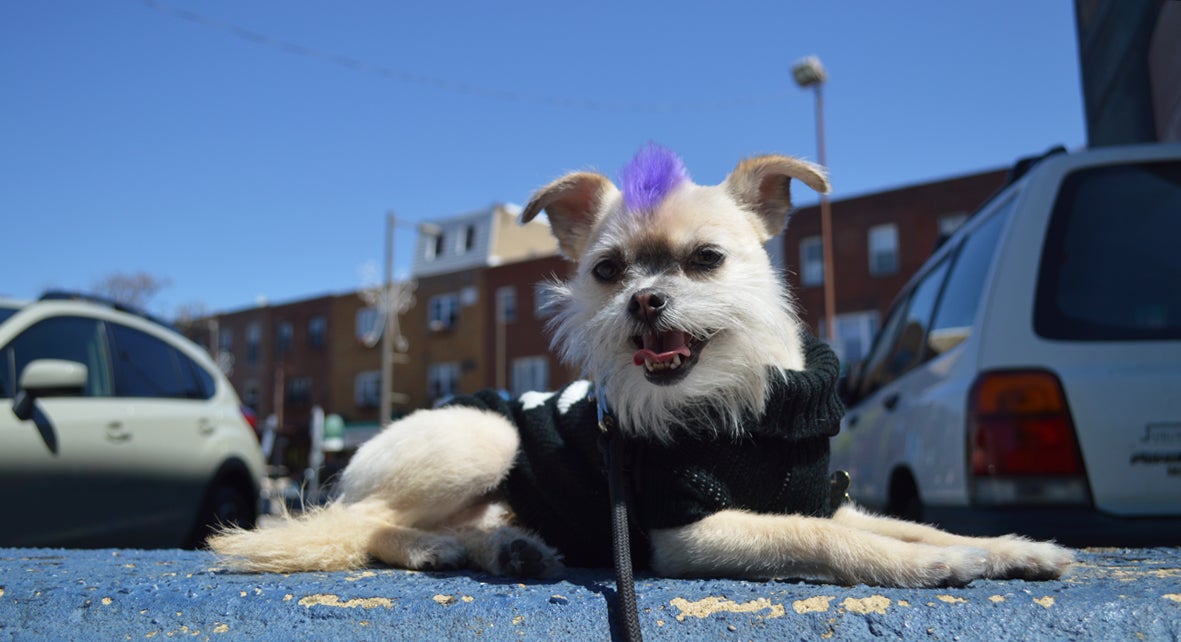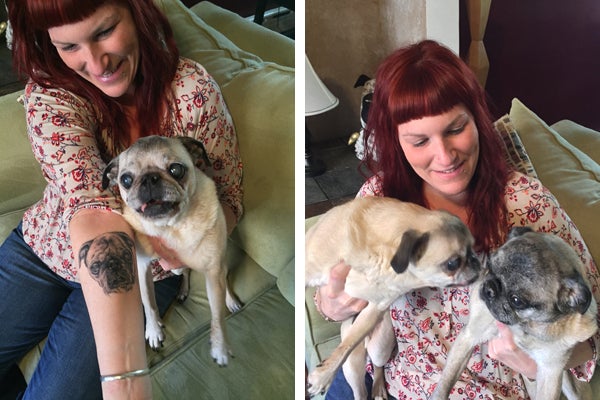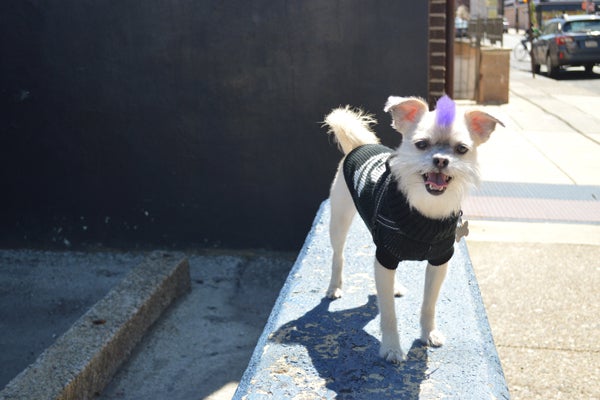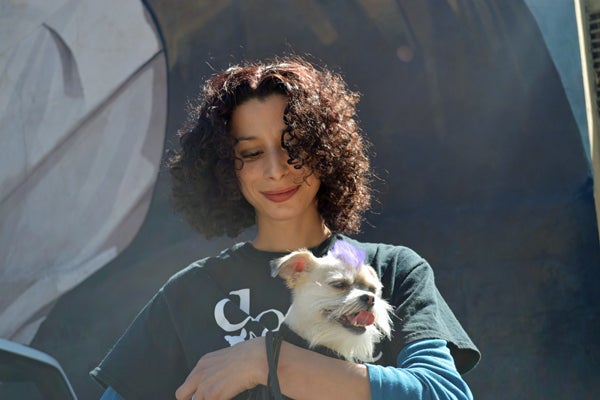Why do we think our animals think what we think?
Listen
Spartacus has a finely coiffed purple mohawk. His owner thinks of him as a child. But do we give animals too much credit? (Paige Pfleger/WHYY)
“It’s very easy for us to perceive minds in others, when things look like us, when they make noise, when we interact with them, when they pur or bark, those cues compel us to see minds in creatures.”
“Alright mister, we’re going to put your sweater on,” said Geeta Koets as she rifled through an entire drawer full of dog clothes. She settled on a light blue sweater with an argyle pattern, reminiscent of an appropriate choice for an Ivy League ski club outing.
“This is his is the newest thing; I bought it two days ago,” said Koets, as she pulled the sweater over Spartacus’ head.
Very stylish and very loved
His name is undoubtedly an ironic choice, as he is a skinny, little thing, with short, white fur and a lot of joyous energy. He’s part Chihuahua and part terrier, but not a barker.
Next, Koets fixed the hair on his head. “Not to forget the mohawk that has made you famous,” she said, spiking up the tiny patch of purple hair on her dog’s head.
“He’s had an orange dye, a green dye, and then we decided to go with purple this year,” she said, adding that Spartacus enjoys having a unique style. “Because everybody says he is so cute, and then he poses.”
Stepping out from their row house, Koets and Spartacus make for a fetching couple.
She is tall and thin, and was dressed in a mini skirt, polka dot tights, and boots. Her black hair was braided in pigtails. Neighbors waved and made small talk as they walked to an upscale pet store called “Doggie Style,” where Koets works. This was her day off, though, and she only stopped in to buy Spartacus a new sweater.
“Don’t yell at me for it,” joked Koets with one of the clerks. “Does Kyle know?” he asked. The clerk has made a deal with Koets’ husband Kyle to alert him when she’s buying more stuff for Spartacus.
She admits that Kyle doesn’t know, but bought the sweater anyway – a black one with a skull and crossbones design. “This is his rebel without a cause outfit,” said another clerk, who was in the process of planning a birthday party for her dog.
Koets says she knows Spartacus is spoiled, and that she’s spending way too much money on him. He has four dog beds, but always sleeps in Koets’ bed. He goes everywhere with Koets and her husband, and occasionally travels in a special bag. He eats top of the line expensive raw food with duck and venison – but she feels it’s only right, because they have a special bond – one that started the second she saw him at a shelter.
“As I walked in, there was this ugly looking thing, not even a pound, and I was like, ‘that’s my son’ so, yeah, we’re very happy,” she said. “We know he’s a dog, but he’s the best dog; he’s our kid.”
Koets analyzes the dog’s reactions to every purchase – whether he likes or dislikes a certain sweater or a new bed. When she occasionally forgets to thaw out his special raw food – she believes Spartacus is deeply disappointed. “He’s like – ‘really, mom? Really?’ I can see it, he is giving me the ‘really, mom?’ look.”
 Koets and Spartacus at Doggie Style, a pet store that Koets works in. (Paige Pfleger/WHYY)
Koets and Spartacus at Doggie Style, a pet store that Koets works in. (Paige Pfleger/WHYY)
The soul mate pug
In another South Philadelphia row home, Jennifer Augustin and her husband, Chris, live with two cats, a turtle, and two pugs.
“Max is 14 and Frankie is 11. And I hate to say this, but Max is pretty much my dog soul mate,” she explained.
She has spent thousands of dollars on her pugs’ health – especially Frankie, who had a difficult surgery and has ongoing health issues. She is very concerned about Frankie, and chokes up as she explains his difficulties, but it’s Max that is closer to her heart.
She says it was love at first sight. “Max is like the dog version of me. He’s amazing, he’s cocky, which I love, he’s independent like me, which I love.”
Augustin has bright red hair and rolls up the sleeve of her flowery shirt to reveal a tattoo on her arm – it’s Max’s pug face. She worries sometimes that Frankie feels slighted. “Frankie and my husband are more connected, they have more of the bond, because Chris, my husband, and Frankie are similar people.”
She used the term “people” to describe her pug without thinking, but explained that she does think of her dogs as people. “If people ask me if I have any children, I’ll say ‘yes, my pugs Max and Frankie.’ I think of them as little people.”

Jennifer Augustin with her pugs, Max (left) and Frankie (right). (Maiken Scott/WHYY)
Perceiving a mind just like ours
Pet children and pet soul mates are the stuff of Kurt Gray’s research studies. He is a professor of psychology and neuroscience at UNC Chapel Hill, and studies why people anthropomorphize – meaning, perceive a human-like mind in a non-human agent.
“It’s very easy for us to perceive minds in others, when things look like us, when they make noise, when we interact with them, when they pur or bark, those cues compel us to see minds in creatures.”
Of course pets do have minds, and experience emotions such as joy and fear; there’s a lot of research on that. But Gray says their minds are not like human minds.
“Those of us who have pets as children,” (Gray puts himself firmly into that category) “I think we vastly overestimate the amount of mind they have.
So we think they have this rich emotional life, people think their dog can feel Schadenfreude, pride, or nostalgia, and I’m not sure their neural architecture supports that.” Gray has just published a book titled “The Mind Club: Who Thinks, What Feels, and Why It Matters.”
He has two cats, and admits that he and his wife, who is also a neuroscientist, spend a lot of time discussing their cats’ personalities – while occasionally stopping themselves to acknowledge that their cats are likely not experiencing the kind of emotional subtleties they are attributing to them.
But then, during the theme music for “The Americans” they do a Russian dance to impress their cats – while, Gray says, they remain mostly ambivalent regarding their efforts.
Anthropomorphism as a strength, not a weakness, of human minds
Two neuroscientists, doing a Russian dance for their cats – while being aware of the irony of the situation. Somewhat. So – it seems like we just can’t help ourselves? When we spend a lot of time with a pet – we are going to perceive a mind just like ours?
New brain science seems to point in that direction says Nicholas Epley, a professor of behavioral science at the University of Chicago.
“The same neural systems that are involved in whether somebody is lying or telling the truth are the same systems that are involved in thinking about whether your pet has a guilty look or not,” explained Epley.
Epley says he doesn’t view anthropomorphism as a human foible.
“To the extent that this process is the same process that allows me to recognize that my wife of 20 years loves me – it really suggests a different understanding of this,” he said. “This reflects a signature strength of our brains, the most amazing thing our brain can do is to connect to the mind of another agent, to understand other people, and I think this is an outcropping of that.”
And just like with the rest of our emotions – love or dislike for fellow humans, anthropomorphism is highly selective. Which creatures we anthropomorphize depends on a variety of different factors, said Kurt Gray.
“Cuteness figures into a lot of our decisions about animal morality,” he said. “Crows for example are very smart, they can understand physics problems that children can’t figure out.”

Spartacus sports a purple mohawk as his new spring hairdo. (Paige Pfleger/WHYY)
But we don’t think of crows as especially cute, not even baby crows. They are not cuddly. They destroy our crops. So, we don’t buy them sweaters, we make scarecrows.
Where and how we grow up also plays a role.
“If you work on a farm and you see animals as there to do labor, so cats are there to eat mice, and dogs are there to protect your property, then you have a very different perception of animal morality than if you live in Manhattan,” said Gray. “If you have a little dog, that’s your constant companion, you carry your dog to Louis Vitton. It’s a privilege in our society when we are wealthy and can just enjoy them instead of making them work.”
Cashing in on our love
Pets are a multibillion dollar business, and the more we love them and perceive them as human-like, the more money we’re going to drop on them. In 2015, Americans spent over 60 billion dollars on their pets.
Pet food and pet insurance companies do a lot of the research on human perceptions of pets. One study found that 53 percent of pet owners would break up with a partner if their pet didn’t like them. Another study found that 31 percent would rather tell a secret to their pet than to their best friend.
If you look at commercials for pet food, there’s a conscious effort to push those ideas – that pets love us more than humans do, that they keep our secrets, are loyal, and that the bond with them is as strong, or stronger, than human-to-human relationships.

Fancy dog treats at Doggie Style in Philadelphia. (Maiken Scott/WHYY)
Longing for connection to build trust
Research on anthropomorphism is currently a growing field – and it goes beyond our pets.
Anthropomorphism means attributing a human mind to a non-human agent. That can be a tree, a basketball, a computer, a bicycle or a car. Right now, with artificial intelligence gaining ground every day, there is a lot of interest in the interactions between people and computers.
General Motors approached Nicholas Epley to do some research in self-driving vehicles, to study what would get people over their fears with these cars. And it turns out that people are more trusting when they perceive the car to have a mind.
“So when we gave a car a voice, it responded to you, was able to sense what was going on, they were more comfortable driving in the simulator, and they felt more likely to trust the vehicle that it could drive them safely,” said Epley.
Humans long for connection, it’s what makes us human. More than that, we need connections to other minds to feel safe, to trust, to develop relationships. And all we have in terms of a frame of reference is our own minds – so it’s not surprising that when we interact with pets, many people perceive them as having the exact same mind as them.
And there’s something else. Many pet owners say how much they enjoy the unconditional love their pets give them, and that pets ‘don’t judge.’ And maybe there’s an added benefit in that pets don’t talk back.
“I would love for [Spartacus] to think the things I think he’s thinking,” Geeta Koets said with a laugh. “But, it’s so nice to have something where I can be like ‘I think he really likes it’ and not think ‘oh, he really doesn’t like it.’ It’s nice to not have negative feedback, because you think it’s positive, and that makes you feel positive.”

Koets holds her furry companion, Spartacus. (Paige Pfleger/WHYY)
WHYY is your source for fact-based, in-depth journalism and information. As a nonprofit organization, we rely on financial support from readers like you. Please give today.




